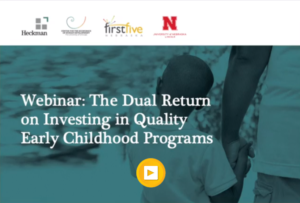The answer may be as much as a 13% annual return on every dollar we invest in high-quality programs for young children, especially those most at risk. On the other hand, Nebraska researchers say we may lose nearly $1.4 billion annually if we fail to strengthen the state’s early childhood infrastructure.
Those were the key messages of “The Dual Return on Investing in High-Quality Early Childhood Programs”—a First Five Nebraska webinar featuring Professor James Heckman, Nobel Laureate economist with the University of Chicago’s Center for the Economics of Human Development. He was joined by Dr. Eric Thompson and Dr. David Rosenbaum of the University of Nebraska’s Bureau of Business Research, who discussed findings of First Five Nebraska’s recently published study on the economic impacts of child care gaps in our state.
The October 22 event drew more than 60 participants including state senators, economic development and higher education officials, city administrators and early childhood professionals.
Targeted early childhood education investments pay off
Professor Heckman is nationally recognized for his groundbreaking research on individual and societal benefits of strategic investments in high-quality early childhood programs, particularly those serving young children most likely to encounter developmental challenges due to poverty. Heckman analyzed the life outcomes of children who participated in the Perry Preschool Project in Ypsilanti, Mich., and North Carolina’s ABC/CARE early childhood programs that were launched in the mid-1960s and 1970s.
The result? Heckman found participants were significantly more likely to attain higher levels of education and higher earning potential as adults, exhibit more positive social behaviors and were less likely to have chronic health problems later in life. He also noted that comprehensive early care and education services offered five days per week for five years made it easier for parents—especially single mothers—to return to the workforce and benefit from greater social and economic mobility. In fact, Heckman observed that the ABC/CARE program paid for itself within five years based on the economic gains made by the parents alone.
Multigenerational benefits of quality programs
Heckman’s research also indicates that the educational, social and economic benefits from involvement in the Perry Preschool Program extended to the life outcomes of the adult children of the original participants. Heckman argues this has everything to do with the fact that children—especially economically disadvantaged children—who have strong opportunities for early skill development are more likely to form more stable marriages and create more secure and positive home and family environments when they have children of their own.
“These programs pay off,” said Heckman. “It’s providing a benefit for the entire economy—not just the present economy, but the economy going forward. You find that the negative consequences of poverty are mitigated by these programs, and it’s a way to promote social mobility.”
Nebraska’s access to quality challenge
While early care and education programs like Perry Preschool and ABC/CARE deliver very high rates of return—as much as 13% per dollar invested, according to Heckman’s research—our mileage in Nebraska may vary based on what we can afford to invest here-and-now in quality services. In the short term, Nebraska faces an increasingly urgent challenge to strengthen the overall child care infrastructure we need to re-mobilize the workforce and increase household income, business productivity and state revenues. As explained by Dr. Eric Thompson and Dr. David Rosenbaum, lead investigators for First Five Nebraska’s Bottom Line report that challenge comes at a heavy cost to Nebraskans—as much as $1.4 billion annually in direct and indirect economic losses due to gaps in child care availability, regardless of quality.
Ultimately, however, it’s up to Nebraska’s public and private leaders to find ways to expand availability of high-quality programs if we are to capture the best possible returns on our investment in children’s early care and development.
First Five Nebraska Director Jason Prokop ended the webinar’s question-and-answer segment by reflecting on the upsurge in community initiatives focused on solving this issue, which appealed strongly to Professor Heckman. “As a Midwesterner myself,” said Heckman, “I like the idea of locally based, Midwestern initiatives really producing solid groundwork for the future and creating the next generation. I’m not surprised, but I’m very pleased.”



